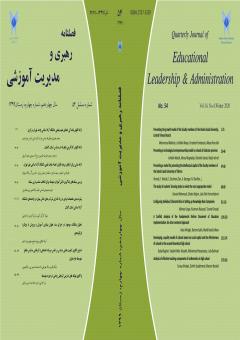Identifying the components of educational justice in education in Iraq
Subject Areas :Jalal Hamdolalah Al Asadi 1 , Zohreh Agha kasiri 2 , Movafagh Abdol Aziz Selif 3 , Seyed Majid Abdullahi 4
1 - PhD student, Department of Educational Management, Isfahan (Khorasgan) Branch, Islamic Azad University, Isfahan, Iran
2 - Assistant Professor, Department of Educational Sciences, Yazd Branch, Islamic Azad University, Yazd, Iran.
3 - prof. Dr. Mowaffaq Abdul- Aziz Al– Hisnawi, Dean of technical institute at Shatrah southern technical university, Iraq - Thi– Qar
4 - Assistant Professor, Department of Educational Sciences, Payam Noor University, Tehran, Iran
Keywords: educational justice, principle of equality, equality of opportunities, education in Iraq.,
Abstract :
purpose: The current research was conducted with the aim of providing a model of educational justice for education in Iraq.
Method: Qualitative research was used in the research tradition of content analysis with an inductive approach. The research environment in this part included managers and teachers working in education in Iraq in 2023, who were selected using a criterion-based purposeful sampling method. The tool used was a semi-structured interview. The tool used was a semi-structured interview. Based on the principle of theoretical saturation, the sampling ended with 15 people and the data entered the coding stage. In the first stage of the coding process, 220 concepts were obtained, which were finally reduced to 132 after removing the similar ones, and in the final stage, using the content coefficient of Lavshe, it was reduced to 100 concept codes under 4 main categories and 13 subcategories. In this section, in order to achieve the required trust, the validation technique was used by the members.
Findings: The findings showed 13 main components including students, teachers, administrators, parents, educational facilities, research facilities, environmental facilities, financial-welfare facilities, justice in attracting and selecting human resources, justice in career advancement and promotion, justice in Academic progress, justice in procedures and policies, and justice in proceedings were identified as the main components of educational justice.
Conclusion: Educational justice is the foundation for the growth and development of science in societies, and paying attention to its main components can provide the basis for the scientific and educational prosperity of an educational system.
اسلامی هرندی، فاطمه، کریمی، فریبا، نادی، محمدعلی. (1397). ارائه مدل عدالت آموزشی برای آموزش و پرو رش کشور، مسائل کاربردی تعلیم و تربیت اسلامی، 3(3): 7-28.
یزدانی شهرام، دشتی رحمت آبادی مرضیه، افشار لیلا، احمدی سلیمان، درخشان اکبر. (1399). اقدامات لازم برای حرکت به سوی عدالت آموزشی در آموزش عالی. مجله ایرانی آموزش در علوم پزشکی، ۲۰ (2): ۲۲۸-۲۳۸
بیات، قدسی، قاسمی، مرضیه. (1398). مفهوم پردازی عدالت در نظام آموزشی ایران: مطالعه موردی کتاب های درسی پیش از دانشگاه، مجلس و راهبرد، 26(100): 7-46.
کاکی، محمد، صدر، آمنه، علیزاده منفرد، سید مجتبی. (1401). تاثیر عدالت آموزشی بر عملکرد تحصیلی، رضایت از تحصیل و پیشرفت تحصیلی دانش آموزان پسر مدارس متوسطه دوره دوم شهر آبدانان در سال تحصیلی1401ـ1400. پژوهش در آموزش مطالعات اجتماعی، 4(3): 31-50.
محمدی، رضا، سلیمانی، امیر. (1402). مرور نظاممند عدالت آموزشی در ایران: مفهوم پردازی، چالشها و شاخصها، مطالعات برنامهریزی آموزشی، 12(23): 145-170.
صادقی ده چشمه، ستار، تیموری نژاد، مهناز، آزادیان، الهام. (1402). رابطه عدالت آموزشی و خشونت (مطالعه موردی: مدارس متوسطه دوم، ناحیه یک شهرکرد، تداوم و تغییر اجتماعی،1(2): 183-198.
خدایی، سمیرا، نصیری، فخرالسادات، خالوندی، فاطمه. (1402). واکاوی سیاست های آموزشی دوران کرونا از منظر عدالت آموزشی از دیدگاه مدیران، مدیریت دانشگاهی، 2(3): 1-19.
کلانتری فریبرز، اسلام پناه مریم، لایی سوسن، محمدی سحر . (2024). ارائه و اعتبارسنجی الگوی عدالت آموزشی مبتنی بر فنآوری اطلاعات و ارتباطات با رویکرد آموزش ترکیبی در آموزش و پرورش، تکنولوژی در کارآفرینی و مدیریت استراتژیک، 4(3): 172-187.
محمودی، مهدی، محمودی، مریم، قریشی، سیدعلی. (1402). شناسایی و رتبهبندی عوامل کلیدی مؤثر بر عدالت آموزشی و ارائه مدل مناسب آن در دانشگاه علوم پزشکی اهواز، مجله علوم تربیتی، 1(30): 81-100.
Alaghehband, A. (2019). Bublic administration, 30th Edition, Tehran: Ravan publication.
Arian Rad, A, Ahadi, A. M. (2016). The issue of educational justice in the first decade of the Islamic Republic, History of the Revolution,1(1), 22-31.
BaBadi Akasheh, Z., Sharif, S. M., & Jamshidian, A. (2010). Providing and Extending Equal Opportunity and Educational Justice in Education in Isfahan, Social Welfare, 10(37):287-305.
Bayat, Gh., & Ghasemi, M. (2020). Conceptualization of Justice in Iranian Educational System: A Case Study of Elementary and Secondary Schools' Text Books, Majlis & Rahbord, 26 (100), 7-46.
Eshuchi, J.C.A. (2014). The Millennium Development Goals and Educational Justice. (Doctoral Dissertation). University Dortmund, Bielefeld University.
Waltenberg, F D. (2010). Essential educational achievement as the currency of educational justice, essential educational achievement, 29 (52), pp: 103-125.
Robbert, M. (2017). Religious Education towards justics: what kind of Justice is to be taught in Christian context? Education science, Available from: journal/education.
Culp, J. (2020). Educational justice. Philosophy Compass, 15(12), e12713.
Levin, H. M. (2009). The economic payoff to investing in educational justice. Educational researcher, 38(1), 5-20.
Yamani, N., Shaterjalali, M., & Eghbali, B. (2017). Educational justice from the perspective of postgraduate students in a medical school in Iran: A qualitative study. Research and Development in Medical Education, 6(1), 23-28.


